Getting Bitten: An Interview with Bryan Aiken of Lazer/Wulf
Perhaps it’s my age, or perhaps it’s a sign of the current musical climate, but it seems as though these days falling madly, deeply and passionately in love with a band is more or less a rarity. But in instances when it does happen, more often than not the band is recommended by a friend, I experience an epiphany upon stumbling upon a band’s live show, or through complete happenstance, I encounter a member or two of the band and strike up a momentary bromance. In the case of Atlanta/Athens, Georgia’s Lazer/Wulf, all three happened.
I recently encountered the band for the first time during their Summer support run with Kylesa, although I was first tipped off by Kylesa vocalist/guitarist Phillip Cope, who has been working behind the boards with the band on their forthcoming full-length. To say the experimental, genre defying trio captured my attention with their virtuosity and spitfire performance would be an understatement. The fact that bassist Sean Peiffer was so gracious and hilarious during our post-set conversation sealed the deal. I grabbed the band’s contact information (on a business card that proclaimed them “Attorneys At Rock”) and circled back with the band weeks later.
That said, Ghettoblaster had the pleasure of discussing all things Wulf with guitarist/vocalist Bryan Aiken a few weeks after the band completed their Summer run with Kylesa. He discussed road testing their material, the writing and recording process behind their as-of-yet untitled record, manifesting ones ideas in musical catharsis, the joys of short-lived Martin Short character Jiminy Glick and more…
As of late you’ve been working on your debut full-length with Phillip Cope. What has he been able to lend to the endeavor that has helped to shape the sound of the record?
We’ve always recorded independently, with friends who are experimenting with the sound of our albums as much as we are, but Cope and the entire staff at Jam Room knew exactly what we didn’t know we really wanted, things we couldn’t express. We finished almost an hour of arguably theatrical music in less than 10 days, which could have been a nightmare, including a double-drum song we had to pull off live. But they’ve seen it all. Nothing surprised them or threw them off their game, and their support was inspiring.
Phillip is an incredible mind anyway, but especially in the studio. He’s organized and intense about his craft, and surprisingly adventurous; he helped us create a lot of sound effects in the studio that will eventually tie the album together, and anyone less would have thrown us to the curb clutching whatever absurd props we toted in. But he happily attempted anything we would suggest, and found a way to make it work, even at a loss of sleep. His faith in us will absolutely shape our career.
When did you begin writing for the record?
A lot of it came in short, furious bursts in the last year, so we could have enough time to revise each piece while it’s fresh. Instrumental music is such a balancing act, because with each song we’re trying to communicate a distinct thought or image as wordlessly as we can, while also trying to keep them relatable, interesting as a whole and worth revisiting.
The album is in three distinct phases, so we would hastily mold some third of it, then shape it properly after playing it live a few times. The only way to really know a song – its pacing and clarity of purpose – is to play it live and note the crowd reaction. Like a sweaty, volatile focus group. And we’re not always looking for some blowout; sometimes the reaction is an uncomfortable silence or deliberating stare, and we know we’ve found something worth doing.
Is there a concept behind it that ties the record together?
Absolutely. We don’t mean for it to be received as a concept album, because that’s not important to us, but our inspiration for writing it was pretty focused. It’s just an organized way to write large pieces of music, having a theme or narrative to refer to. Given how dark our lives have gotten, it was important to look at what we’ve learned and express it in a clear way.
And so the album is about choice, choosing to change your life however drastically if you’re not happy, and the realization that even those choices don’t have to be final. You can always go back, choose again. It’s about opposite paths, so the album plays out symmetrically: some songs refer to or oppose others; some are the same song that we learned to play backwards, but you’d never know; then there’s the centerpiece of where you stand in the middle. It feels like twin albums that hate each other, but couldn’t exist without their counterpoint. It was just a lot of fun to write and put together, having an outline of what we wanted. Without a clear goal, I feel like our music would just spiral off into nonsense.
When can we expect the record to hit streets and what label will be releasing it?
We haven’t gotten there just yet; we’re still finishing production on the album, and I’ve been doing all the art myself between tours, so there’s still a lot to do. We haven’t even narrowed down a title yet! For now, we’re biding the time that being an underground band affords us, building awareness through touring and supporting our most recent EP and multi-media project, There Was A Hole Here. It’s Gone Now. Before we decide on a label, we want to prove ourselves and earn our way.
There’s a level of virtuosity to each of your playing styles. Do you spend a lot of time practicing or running scales? Is it physically challenging to play a Lazer/Wulf show?
That’s very kind of you!
Sean and I are self-taught on our instruments, so I’m sure our form is terrible, but we’ve all studied theory in some capacity. It’s important to know the rules worth breaking, so you can do it smartly. We’re definitely nerdy about our gear, but I’ve always loved great songs more than great players, so that’s our focus; it’s never intended to be flashy, but all these songs are just really fun to play. With any luck, we’ll be doing it for a while, so it helps to have fun playing every set by virtue of the music alone.
Brad actually has a degree in jazz drumming, and joined our band to branch into metal, rather than out, and that’s an important distinction – L/W tends to experiment towards metal from other places, rather than being a metal band that sometimes jumps ship.
Brad’s got the greatest challenge physically – longish thrash songs are not ideal for a drummer, I realize – but it’s taxing for the rest of us in other ways. For me, some songs are hard to play physically for what I’m forced to revisit emotionally; there are some songs I can’t bring myself to play with my eyes open. I wouldn’t have written them if they didn’t mean lot to me, if I didn’t need to say something, and that cycle of catharsis manifests itself through fits of violence onstage, every single time, and it can be scary for me – sometimes bloody.
Lazer/Wulf has been given the “fusion” tag by a lot of other publications. Do you believe that is accurate? How do you describe the band to people who’ve not heard you?
I’m not sure how I’d describe our sound, so I certainly can’t judge how accurate anyone else’s description is! We’re not set out on anything so specifically that we’d be able to “brand” Lazer/Wulf, even as a metal band. We’re no more loyal to any one genre than our individual music libraries are. People like to categorize things, I do, and it’s interesting to watch them have fun with it when they’re at a loss. It gets very creative and metaphorical. But I’m not sure what we are; I want to be a band that people pass on by saying, “I’m not sure how to describe it, here, just listen.”
So I tend to keep it vague with “experimental trio,” because I don’t feel right divorcing us from any possibilities. We’re not always instrumental, or even metal. Our being a trio is the only thing so essential to our sound that it prerequisites where our songs may go. Most of my inspiration comes from whatever book I’m reading at the time, and that changes pretty drastically. I suppose it’s ironic that so much instrumental music would be inspired by a medium entirely of words. If it’s a sci-fi romance, expect lots of reverb.
And we are labeled instrumental overall, always have been. It’s not wrong, but we do use vocals when the moment is right, so even that classification doesn’t entirely stick. The moment we feel comfortable with a description, or we start hearing the same terms from different sources, it’s probably time to shake things up again. Not because we want to be mysterious. Sure, it’s fun to surprise an audience, but it’s satisfying on a much deeper level to surprise ourselves.
What were some of your favorite experiences from being on the road with Kylesa, Blood Ceremony, and White Hills?
Six weeks is a long time, and I can’t count the number of times I was overwhelmed with the joy of it. They’re all incredible people and players, and we made close friends, all over the continent, every day. The best way to travel is meal-by-meal, though, so seeking local cuisine was very important to us. The first time I tried Poutine was among my favorite experiences of the tour.
The best part, however, were the long drives across Canada – two days through the untouched expanse of British Columbia, hours from any city in any direction. Waterfalls, bears, stars… it’s the most beautiful place I’ve ever been. And I was only there because of some songs we wrote. I will never grasp how lucky I am to do this.
You’ve got at least one celebrity fan in Brian Posehn. Did you have the opportunity to meet him at the L/W show he attended?
We played his after-party in Athens, GA following a set he did there. He had no obligation to show up, much less to stay late enough to see our full set. Plus, he had a long drive to catch a flight mere hours after we finished, and he still came, stayed, and tweeted his praise after the show. He’s a true music lover, and we’re so lucky to have met him.
Do you have any forthcoming tour plans we should know about?
We’re not allowed to announce any dates at the moment, but we should be on the road again this September and October.
You guys have had a lot of bad luck with van break-ins. Are you going to start booby trapping it?
Each time we’ve been robbed – it’s been four now, and twice this year – we’ve redoubled our security to the point of having a steel cage installed in our van. I don’t know how else to prepare. Tarantulas, Christmas ornaments, paint cans on strings… we’re gonna start Home Alone-ing some motherfuckers.
But I would never count us unlucky. We’ve had an incredible year writing and recording our debut LP, and we just finished our first North American tour to overwhelming positivity. If these are our dues, we’ll happily pay them. No complaints.
What is it about Jiminy Glick that you relate to?
Haha, it’s hilarious, but you know how his voice changes so drastically over the course of a single sentence? It’s starts as a twinkle into a growl and back again until he loses his mind and falls out of his chair. I’m not sure our voice doesn’t do the same thing in a single song, or across an album. It’s silly, we both are, but there’s a place for that. It shouldn’t all be so dark all the time.
(Get bitten here: https://www.facebook.com/lazerwulves.)




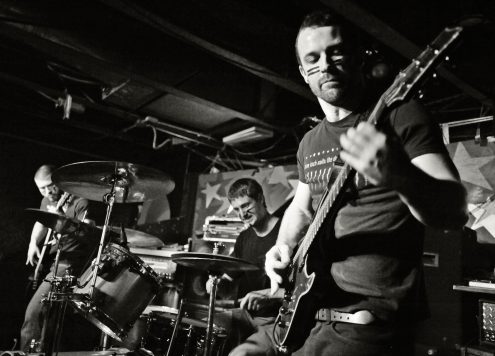
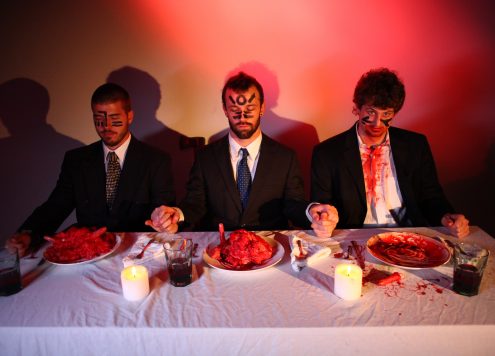
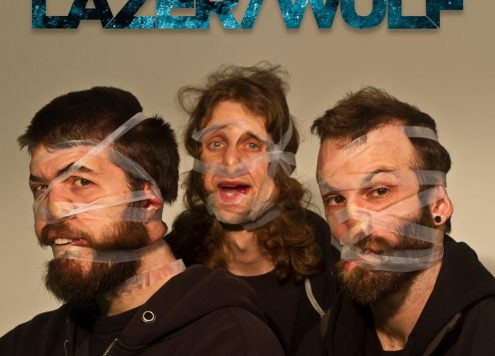
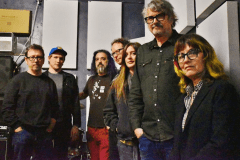
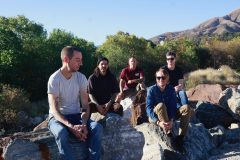
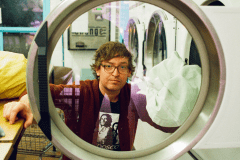
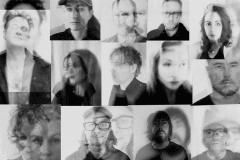

Social Media